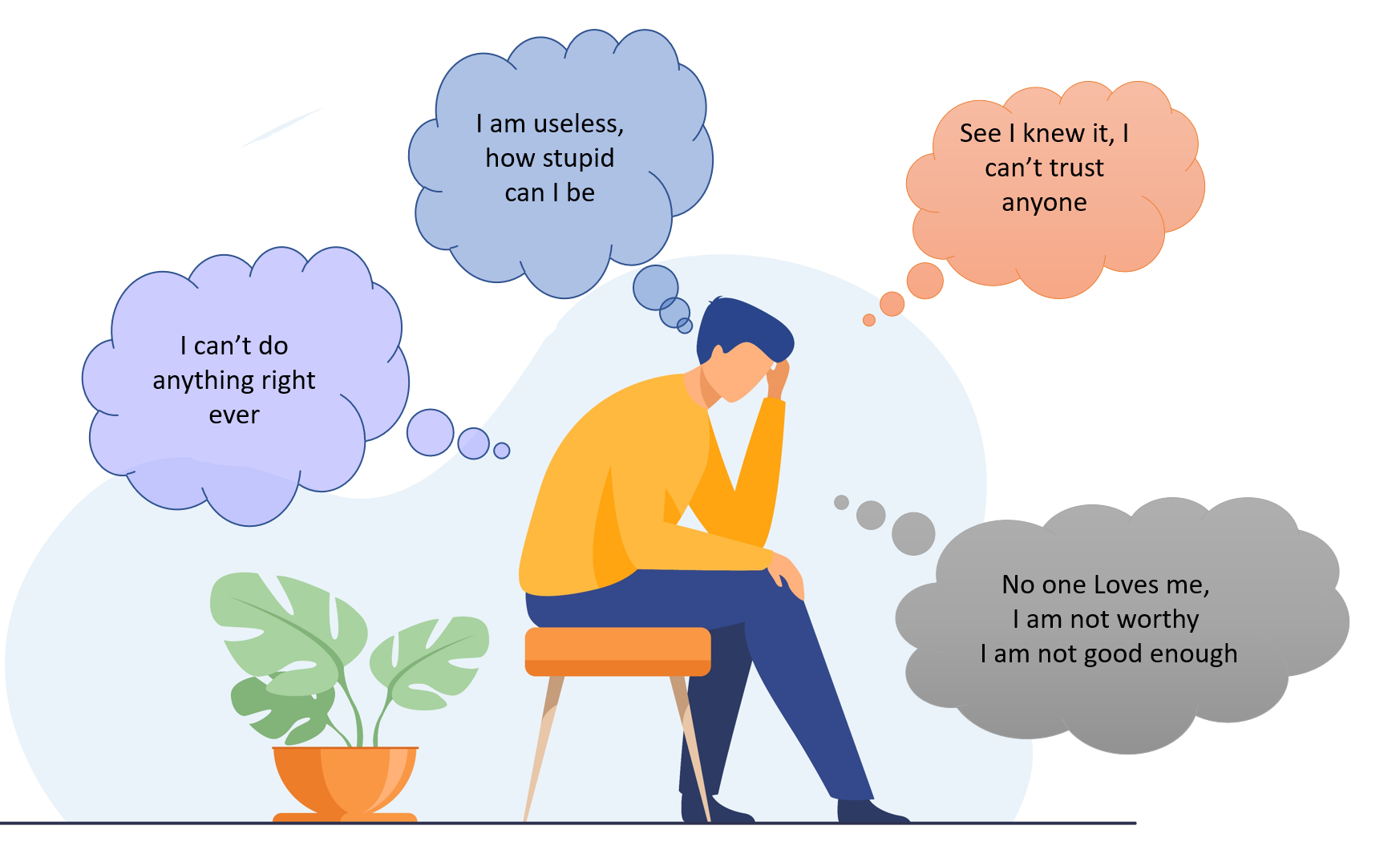What is inner critical voice? Why is it so powerful?
What is this inner critical voice? Where does this inner critical voice come from? How do they get so powerful?
The inner critical voice is a set of negative thoughts and attitudes and associated emotions, towards one’s own self as well as others. Though we use the term voice it is not a real voice but an internal dialogue that happens within.
When you are in a difficult situation, or trouble or made a mistake etc, observe what you tell yourself. The situation could be as simple as spilling of coffee or tea on your new dress, or sending a wrong email to your boss or client, or a conflict / fight with your loved one. You might tell yourself “I am useless”, “how stupid can I be”, “I can’t do anything right”, “see I knew it, I can’t trust anyone”, “no one Loves me “, “I am not worthy or good enough” etc which you know is not really true but you still believe it.
What is the impact of this critical inner voice?
The impact on you is significant. It impacts your confidence negatively, lowers your self-esteem and may give you an impression that the situation is grave and catastrophic. This can have a significant negative impact on your emotional state and your mood. These can become barriers for you to achieve your potential and in extreme cases can lead to depression, anxiety, self-harm and even suicidal thoughts and attempts.
The intensity and impact of the inner critical voice could vary from mild – simple disapproval like “Why didn’t I do it right” to moderate – strong negative judgement – “I am useless, I can’t ever do anything right”, to severe – could lead to self-harm / suicidal thoughts – “I am a burden to everyone around. I might as well die”.
Where do we get the inner critical voice from?
It is possible that each of us would have had mixed bag of experiences as part of our childhood. As a child we looked around ourselves and tried to make sense / meaning of what was happening around us as well as what was happening to us.
The child has limited resources in terms of cognitive skills to have a clear understanding of what is happening around. Some early life experiences could have been difficult or experienced as difficult given the limited resources that the child has. These early experiences are internalized and form a part of how we see ourselves.
How does the inner critical voice manifest?
Sharon’s father was an alcoholic and would abuse Sharon’s mother and blame Sharon for his problems. When she was 7 her parents separated and she stayed with her mother. Though her mother was loving towards her, there were financial difficulties that they faced. Sharon internalized these experiences, believing that “I am a burden to everyone”. In adult life when she had any conflicts with her partner, her internal critical voice would come up saying “I am a burden”.
Roopa had a childhood where all her needs were taken care of. Her mother had the reputation of being the best/ideal mother, perfect wife, perfect daughter in law in her family. Though there was no explicit pressure on Roopa to excel, she took in her mother’s attitude of “being perfect” and internalized it. When she couldn’t stand first in her school in her board examinations, she couldn’t handle it and became depressed. Her internal critical voice was “Unless I am perfect, I am no good”.
Raj had two elder brothers who were very accomplished both in academics and in sports. Though Raj was also encouraged to study and take part in sports he was an average student. His brothers would taunt him though in a seemingly friendly manner. Raj felt inadequate and internalized a belief that “I am not good enough”. In adulthood, though Raj had a Master’s degree and is a senior executive in a top firm, whenever he had a challenging situation, he would struggle with the inner critical voice which would taunt him saying “You are not good enough”.
These are some examples of where the internal critical voice could originate from. It could be what the child was told repeatedly by parents or parental figures, or what the child saw in parents or other significant role models as attitudes or beliefs, or what the child made sense of in a difficult childhood situation, given that the child has only limited cognitive resources.
The greater the impact on the child, the greater the power the inner critical voice gains. As we grow up
Is it possible to fight against the inner critical voice?
Having said that, all is not lost. It is possible to keep the inner critical voice in check and not allow it to take control of us. It is important to be aware that what the inner critical voice says may not be the absolute truth. It is possible to understand the level of exaggeration that it entails and to challenge the inner critical voice.
Here are four simple steps to follow to challenge your inner critical voice and take away its power over you. Inner Critical Voice: 4 simple steps to counteract it.
Psychotherapy can help uncover the origins of your inner critical voice and to heal these primal wounds so that you can take charge of your life and live up to your potential.
About the Author:
Kala Balasubramanian is a certified Counselling Psychologist and Psychotherapist with a Masters in Counselling and Psychotherapy, Diplomas in Counselling and has further certifications specializing in couple/marriage/relationship counselling and family counselling. As a trained therapist, she provides professional and confidential counselling services including Individual counselling and Couples counselling / Marriage counselling in Bangalore and Online Counselling over video calls for others residing outside Bangalore and abroad.
Currently with the COVID-19 situation, all counselling services are offered online over video calls.
References:
https://www.erickson-foundation.org/the-critical-inner-voice/
https://www.psychalive.org/critical-inner-voice/

